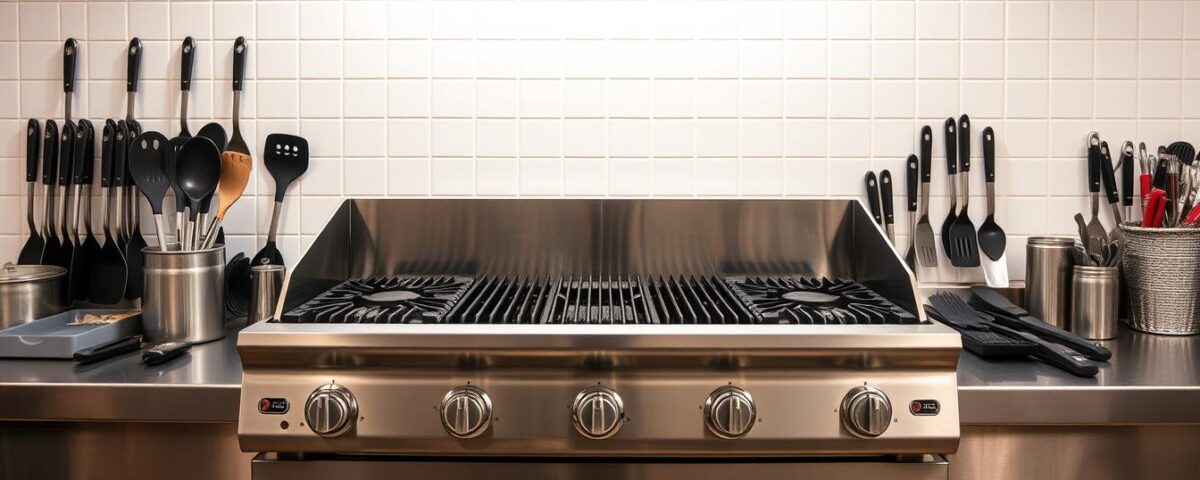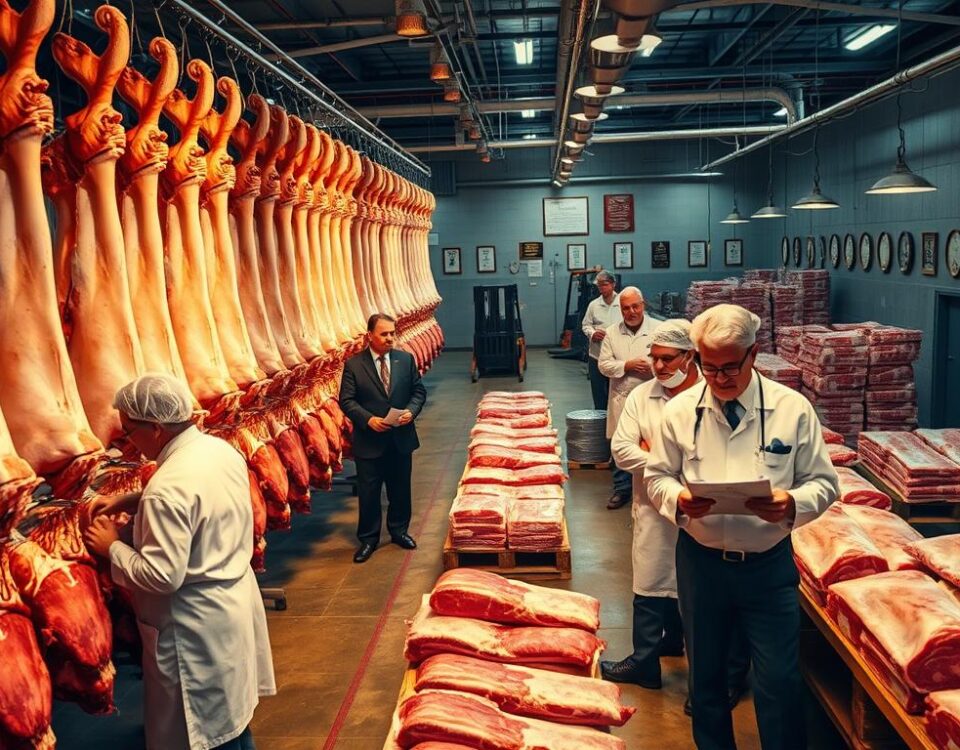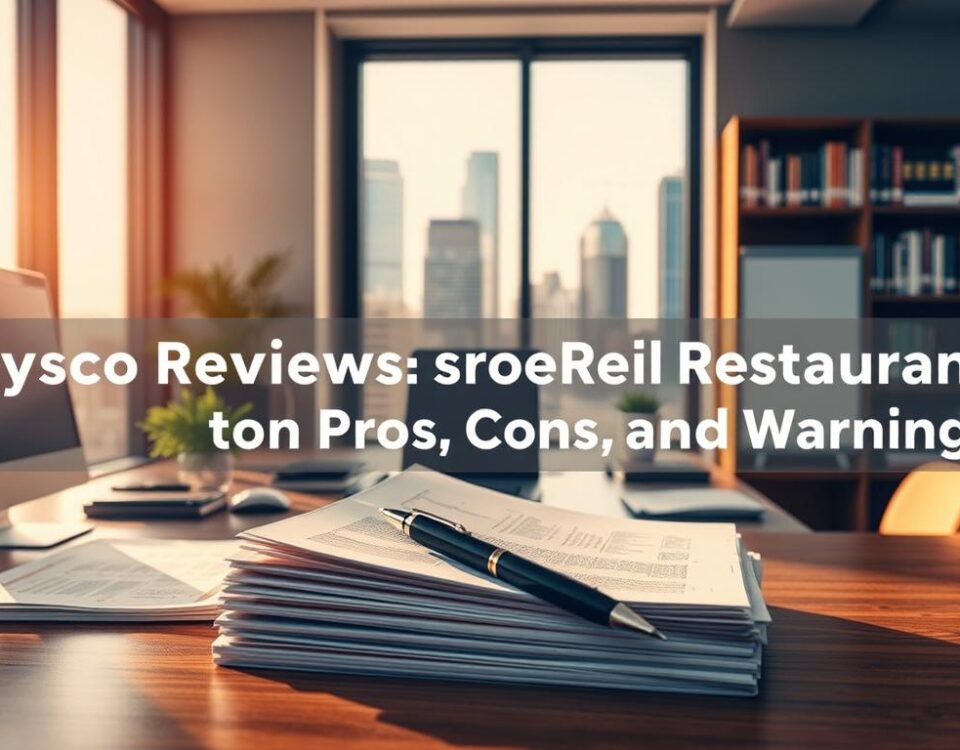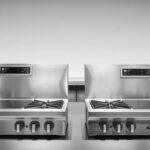
Quick Comparison Guide: Southbend or Vulcan for Your 2025 Kitchen
September 7, 2025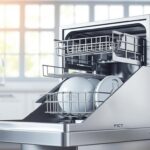
The Commercial Dishwasher Buying Guide You Need
September 8, 2025I still remember the sizzling summer evening when our food truck’s grill produced the most mouth-watering burgers that drew in a crowd. It was a moment that highlighted the power of a great grill in a commercial setting. A well-chosen commercial grill can be a game-changer for any food business.
Did you know that a staggering 70% of consumers crave the char-grilled flavor when dining out? This statistic underscores the importance of having the right grill setup to meet customer expectations and maximize sales. With the perfect grill, you can efficiently serve a high volume of customers while maintaining quality.
So, what makes a commercial grill setup truly exceptional, and how can you choose the best one for your business? Let’s dive in to explore the key factors that can elevate your sales and customer satisfaction.
Key Takeaways
- Understanding the different types of commercial grills and their benefits.
- Identifying the right grill size and configuration for your business needs.
- Learning how to optimize grill performance for maximum efficiency.
- Discovering the importance of maintenance for prolonging grill lifespan.
- Exploring how the right grill setup can enhance customer satisfaction and sales.
Why Your Commercial Grill Setup Matters for Business Success
A well-designed commercial grill setup is essential for maximizing sales and ensuring long-term business success. Your grill is often the heart of your commercial kitchen, directly impacting your food quality, preparation time, and overall customer satisfaction.
I’ve seen firsthand how the right grill can transform a struggling food business by improving consistency and allowing for a more diverse menu. The efficiency of your cooking equipment directly affects your bottom line – faster cooking times mean more customers served and higher sales volume.
- A well-designed grill setup creates a better workflow in your kitchen, reducing staff frustration and improving morale during busy service periods.
- Grills that maintain consistent temperatures are crucial for delivering reliably delicious food that keeps customers coming back.
- The capacity and capabilities of your grills will determine what menu items you can offer and how quickly you can serve them during peak hours.
The visual appeal of open-kitchen grill setups can become part of your restaurant’s atmosphere and brand identity, creating an engaging dining experience. Investing in the right commercial setup is not just about the equipment itself but about positioning your business for long-term success and growth, ultimately enhancing the overall quality of your service.
Understanding Different Types of Commercial Grills
When it comes to commercial grilling, understanding the various types of grills available is crucial for any business looking to maximize its kitchen’s potential. The right grill can elevate your menu, improve kitchen efficiency, and enhance the overall dining experience for your customers.
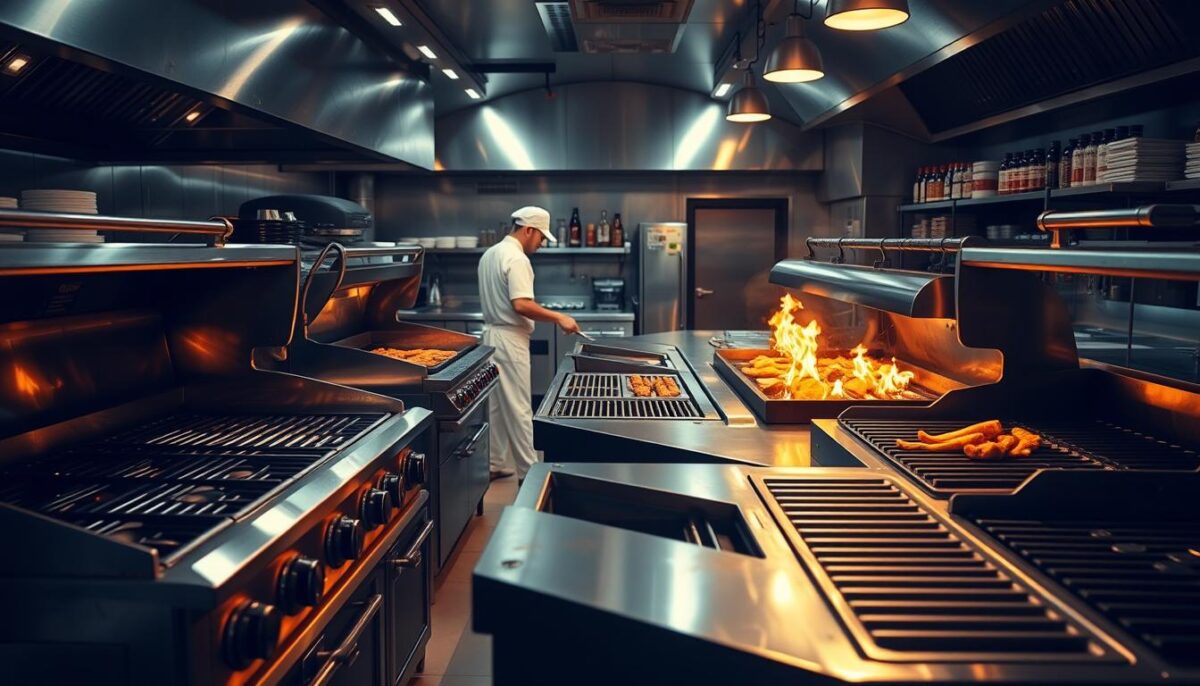
Char Grills/Charbroilers
Char grills or charbroilers are a staple in many commercial kitchens, ideal for achieving those distinctive grill marks and smoky flavors that customers love in steaks, burgers, and other proteins. They employ ‘direct heat’ cooking through gas or charcoal flames, adding a charred look and smoky flavor to dishes.
Griddles/Flat-Top Grills
Griddles or flat-top grills provide a versatile cooking surface perfect for breakfast items, burgers, and delicate foods that might fall through traditional grill grates. Their flat, smooth surface allows for a variety of cooking techniques, making them a valuable addition to any commercial kitchen.
Contact Grills/Panini Grills
Contact grills or panini grills are countertop devices designed for quick, uniform cooking of sandwiches and other foods. They are perfect for cafes and delis looking to offer a variety of pressed sandwiches and paninis.
Salamander Grills
Salamander grills are professional-level equipment used for broiling and finishing dishes, typically wall-mounted with adjustable shelves. They excel at adding that final touch of quality to your culinary creations, making them an essential tool for many high-end restaurants.
Each type of commercial grill serves a specific purpose, and understanding these differences is key to selecting the right equipment for your business. By choosing the appropriate grill or combination of grills, you can significantly impact your kitchen’s workflow, staff training requirements, and the signature flavors of your dishes.
Heat and Power Sources for Commercial Grills
Understanding the different heat and power sources available for commercial grills is essential for making an informed decision. The power source you choose will significantly impact your operational costs, cooking capabilities, and even the flavor of your food.
Gas Grills: Propane vs. Natural Gas
Gas grills are a popular choice for commercial kitchens due to their swift heating and precise temperature control. They can be powered by either propane or natural gas. Propane tanks offer portability and flexibility, making them ideal for mobile food operations or outdoor events, though they require monitoring and replacement. On the other hand, natural gas connections provide a consistent fuel supply without the hassle of tank replacements, but they require permanent installation and may not be available in all locations.
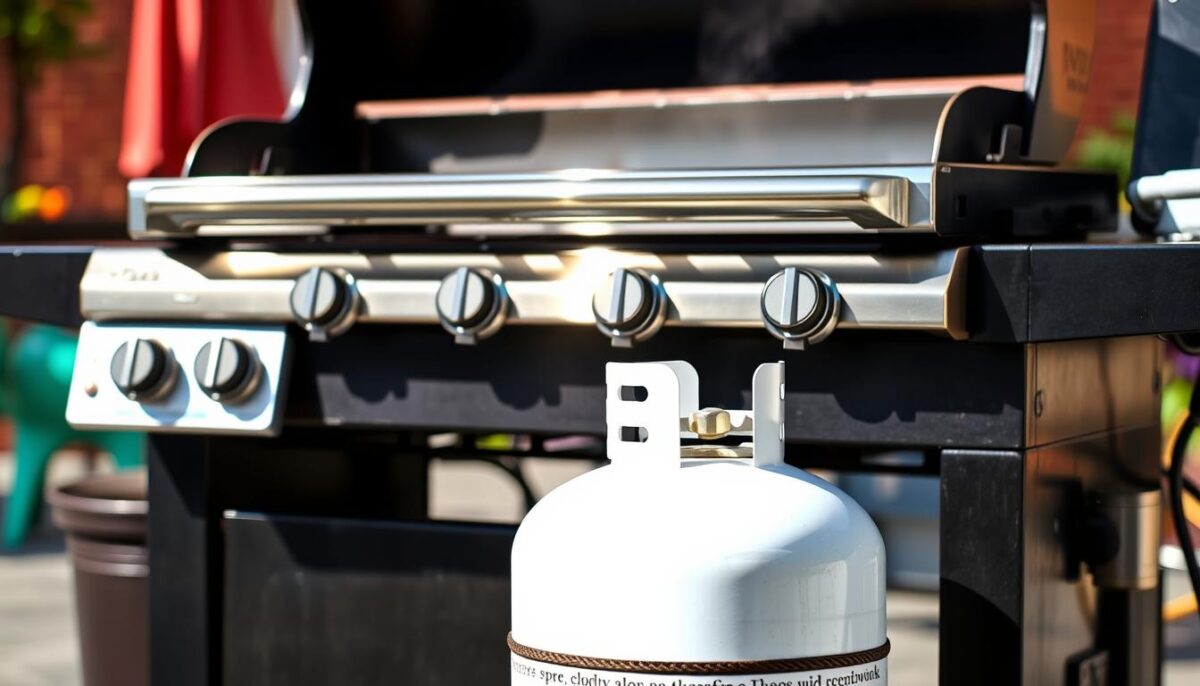
Electric Grills
Electric grills are another viable option for commercial kitchens. They are quick to heat, easy to use, and maintain, and they don’t produce smoke or harmful gases. This makes them ideal for locations with strict fire codes or limited infrastructure.
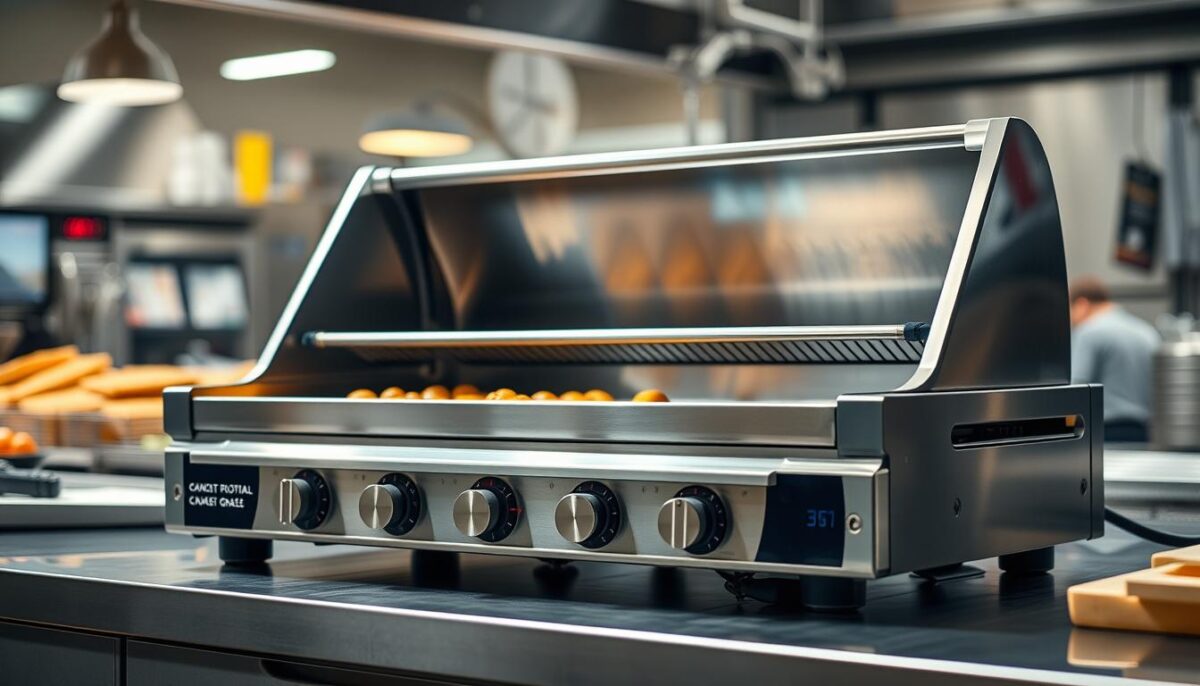
Infrared Grills
Infrared grills provide speedy, even cooking with excellent searing capacity. They use infrared technology to provide extremely high heat for perfect searing while using less fuel than conventional gas grills.
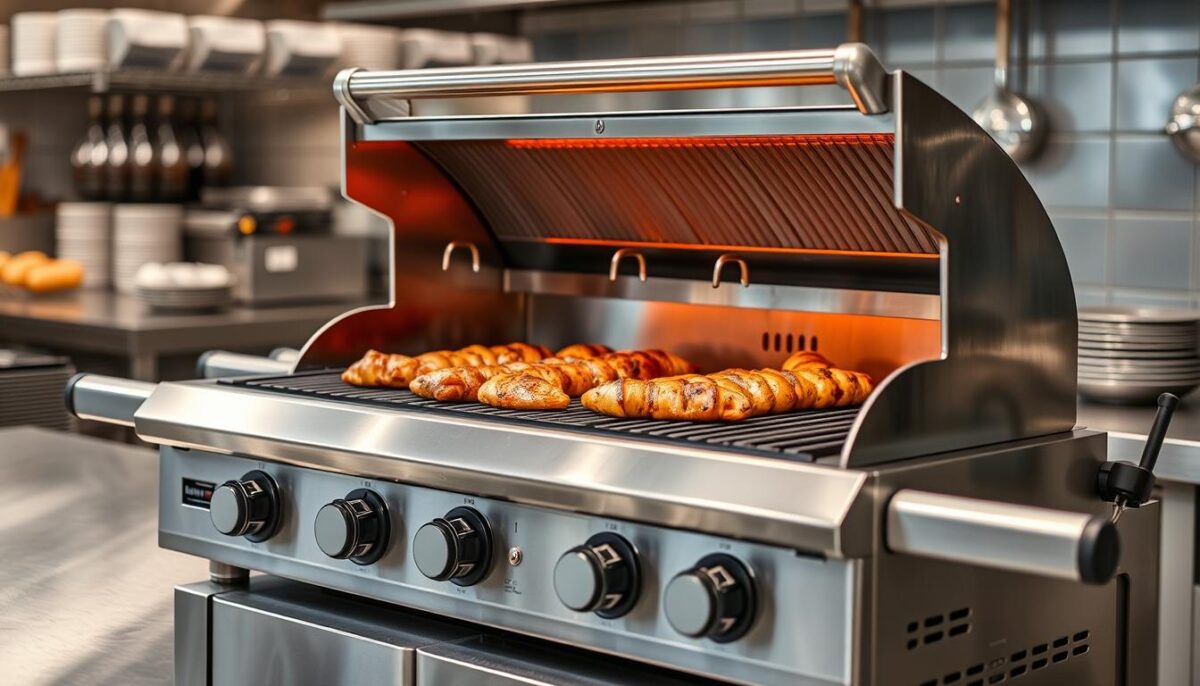
Wood-Fired and Charcoal Grills
Wood-fired and charcoal grills deliver distinctive flavors that can become your signature taste. Though they require more skill to maintain consistent temperatures, they offer a unique smoky flavor and excellent searing capabilities.
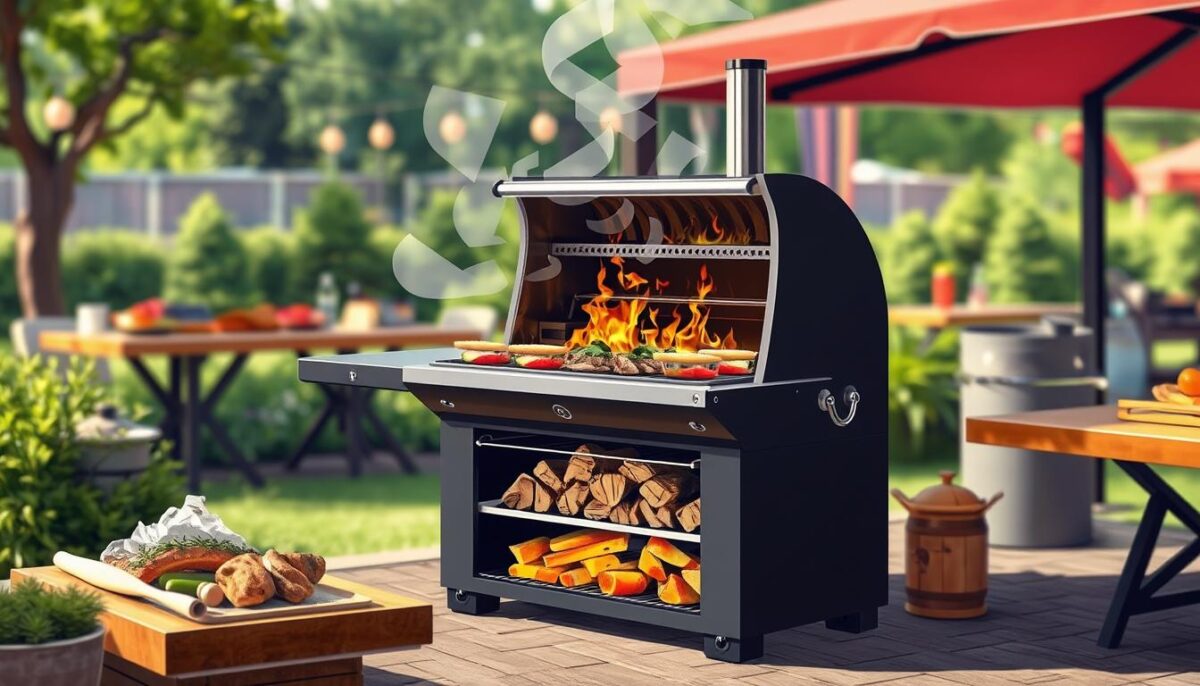
Combination Grills
Combination grills offer versatility by incorporating multiple heat sources, allowing you to adapt to different cooking needs throughout service. They can utilize multiple heat sources and cooking methods, making them versatile but potentially more complex to operate.
Image of a commercial combination grill
In conclusion, the choice of heat and power source for your commercial grill depends on several factors, including operational costs, cooking performance, and installation requirements. By understanding the practical considerations of each power source, you can make an informed decision that suits your business needs.
Matching Your Grill to Your Menu
Matching your grill to your menu is essential for delivering high-quality dishes that meet customer expectations. The type of cuisine you plan to serve will determine the sort of grill you should opt for. Different foods require specific cooking methods to achieve optimal results.
For breakfast-focused operations, a flat-top griddle is ideal for preparing items like pancakes, eggs, and breakfast potatoes. This type of grill allows for consistent results and easy cleanup. If your menu features burgers, sandwiches, and paninis, consider a char grill or contact grill to create those distinctive grill marks and smoky flavors that customers love.
Best Grills for Breakfast Items
A griddle or flat-top grill is perfect for breakfast items, providing a large, flat surface for cooking eggs, pancakes, and hash browns.
Ideal Setups for Burgers and Sandwiches
Char grills and contact grills are well-suited for cooking burgers and sandwiches. They provide the necessary heat and grill marks that enhance the flavor and appearance of these menu items.
Grills for Steaks and Premium Meats
For steakhouses and premium meat-focused concepts, high-heat grills like char grills/charbroilers are necessary for achieving the perfect sear while maintaining juicy interiors. The right grill can elevate your food offerings and contribute to a successful dining experience.
When selecting a grill, consider not just your current menu but also potential future offerings to ensure long-term versatility. The cooking surface material and temperature range of your grill will directly impact the quality and consistency of your signature dishes.
Size and Capacity Considerations
Choosing the correct size for your commercial grill is a critical step in ensuring operational efficiency. To achieve this, you need to carefully assess your production needs and kitchen layout.
Estimating Your Production Needs
To find the right size commercial grill for your business, you will need to estimate your production needs. Experts recommend slightly overestimating your needs, as your production may go up unexpectedly. As I’ve seen in many businesses, spikes in crowds can be hard to anticipate, and it’s easier to buy a grill with a higher capacity from the start than to replace it later.
- Analyzing your peak service periods to determine the maximum number of items you’ll need to cook simultaneously is crucial.
- Many successful operations slightly oversize their grill capacity to accommodate business growth and unexpected busy periods.
Space Requirements and Kitchen Layout
Consider your kitchen’s available space carefully, ensuring proper clearance for staff movement and compliance with fire safety regulations. The layout of your kitchen should facilitate a smooth workflow from prep to grill to plating, minimizing steps and maximizing efficiency. It’s also important to remember that grills require additional space for ventilation systems, which must be factored into your kitchen design.
Managing your time effectively during service is crucial, and having the right grill size plays a significant role in this. I’ve seen many businesses struggle with undersized grills that limit their service capacity and increase customer wait times during peak hours.
The Best Commercial Grill Setup for Different Business Types
Commercial grill setups are not one-size-fits-all; they must be tailored to the specific requirements of different businesses. The type of grill, its size, and features should align with the business’s menu, service style, and operational constraints.
Restaurant Setups
For full-service restaurants, a larger, more permanent grill installation is often beneficial. These setups can handle diverse menu items and high volumes. Consider a charbroiler or griddle grill for versatility.
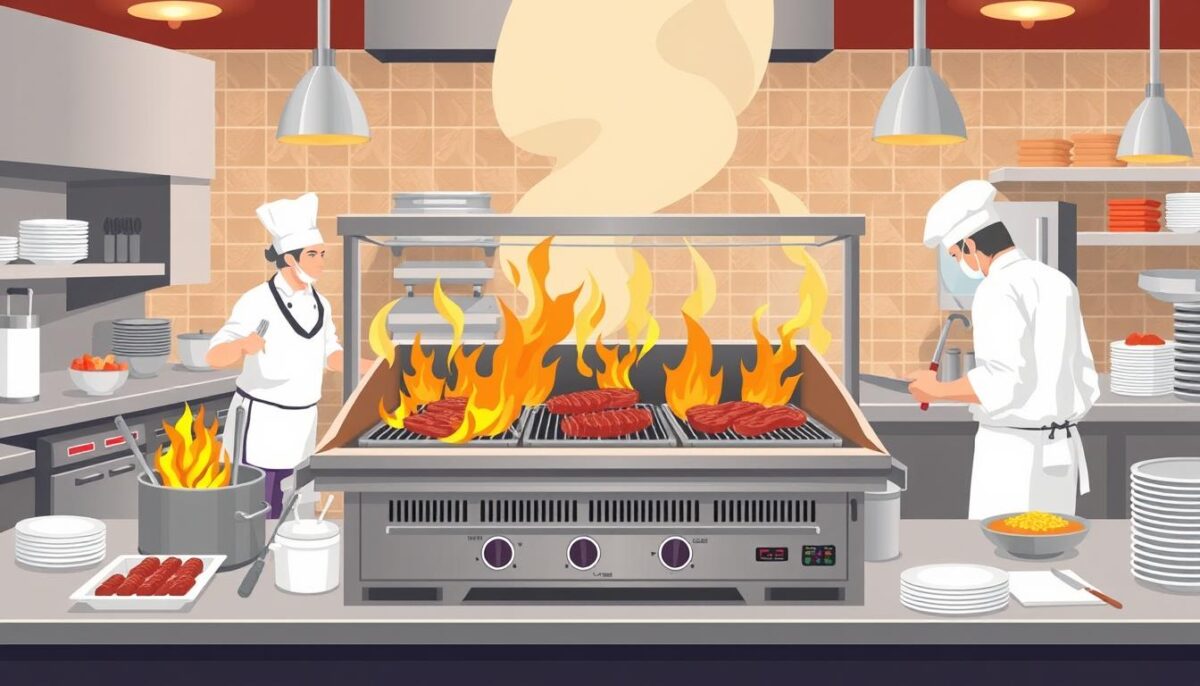
Food Truck and Mobile Catering Configurations
Food trucks and mobile catering operations require compact, efficient grills. Combination grills that offer multiple cooking surfaces in a single unit are ideal for maximizing menu versatility in limited spaces.
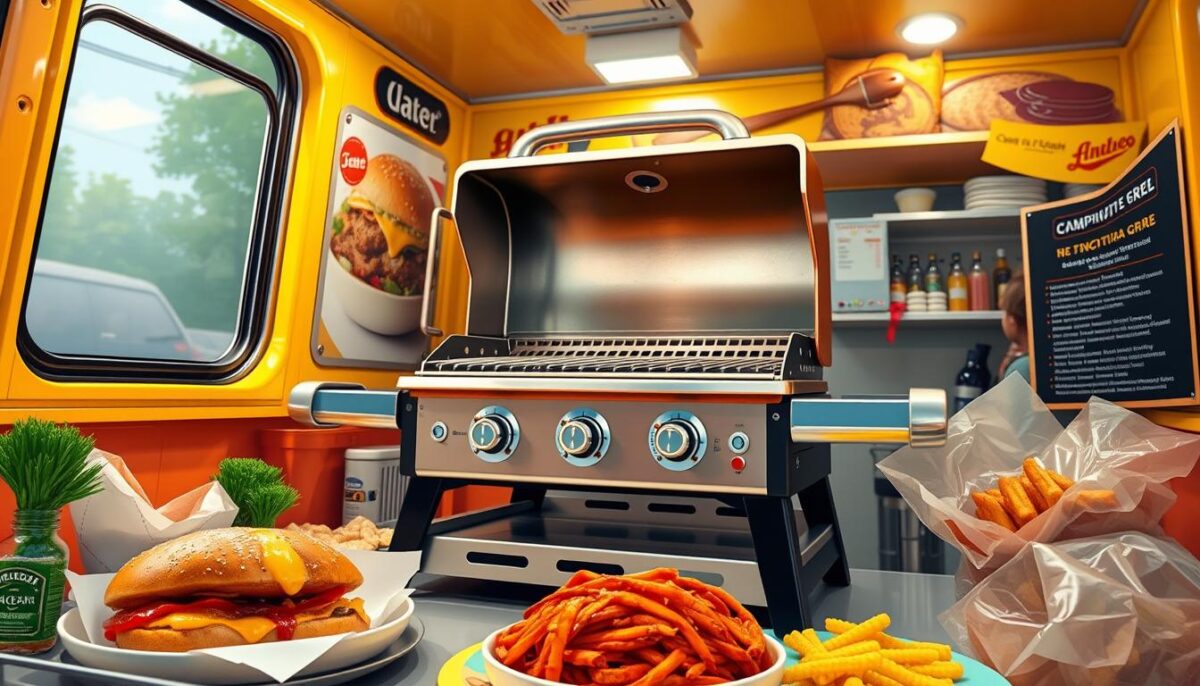
Outdoor Event and Concession Stand Solutions
Outdoor events and concession stands need durable, portable grills that can withstand various weather conditions. Look for grills with robust construction and consider propane-powered options for convenience.
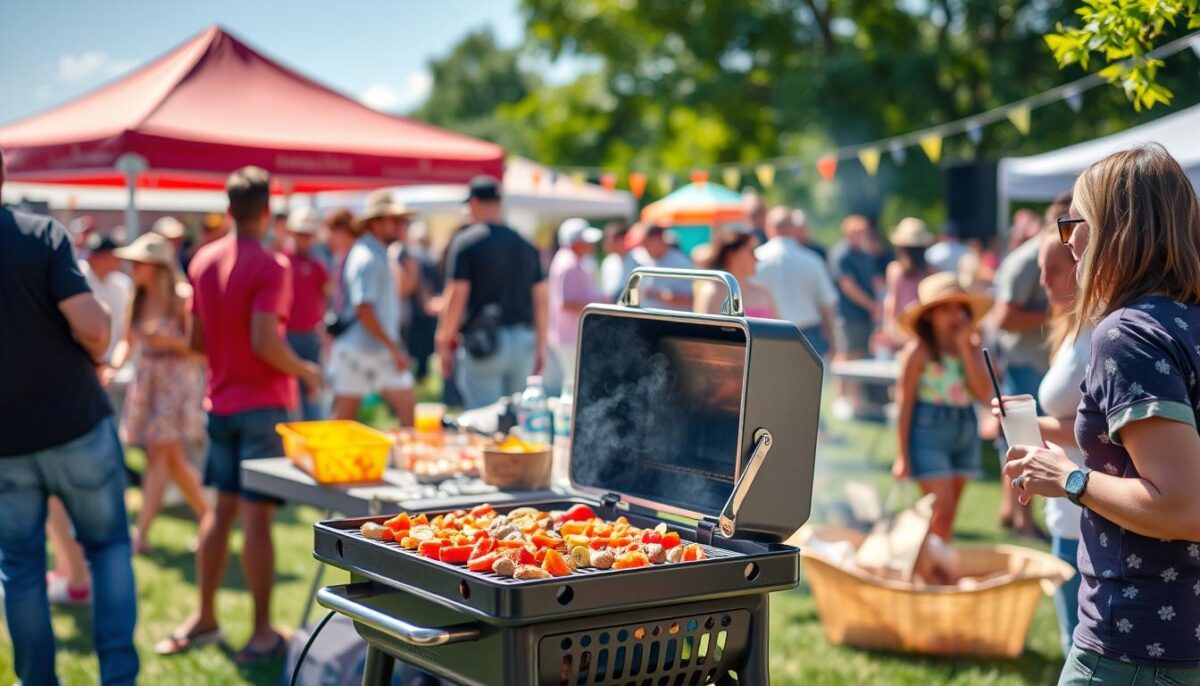
The key to selecting the best commercial grill setup is balancing your specific operational needs with practical constraints like space and utilities. Consider your business’s growth trajectory to ensure your grill setup can adapt to future demands.
Installation Requirements and Considerations
The installation of a commercial grill is not just about placing the equipment; it’s about ensuring it operates safely and efficiently. Proper installation is crucial for the optimal performance and longevity of your commercial grill.
Ventilation and Hood Systems
Effective ventilation is critical for removing smoke, heat, and cooking fumes from your kitchen. A well-designed hood system is essential, and it’s something that often requires professional expertise. I always advise clients to consult with HVAC professionals early in the planning process to ensure proper ventilation design and capacity.
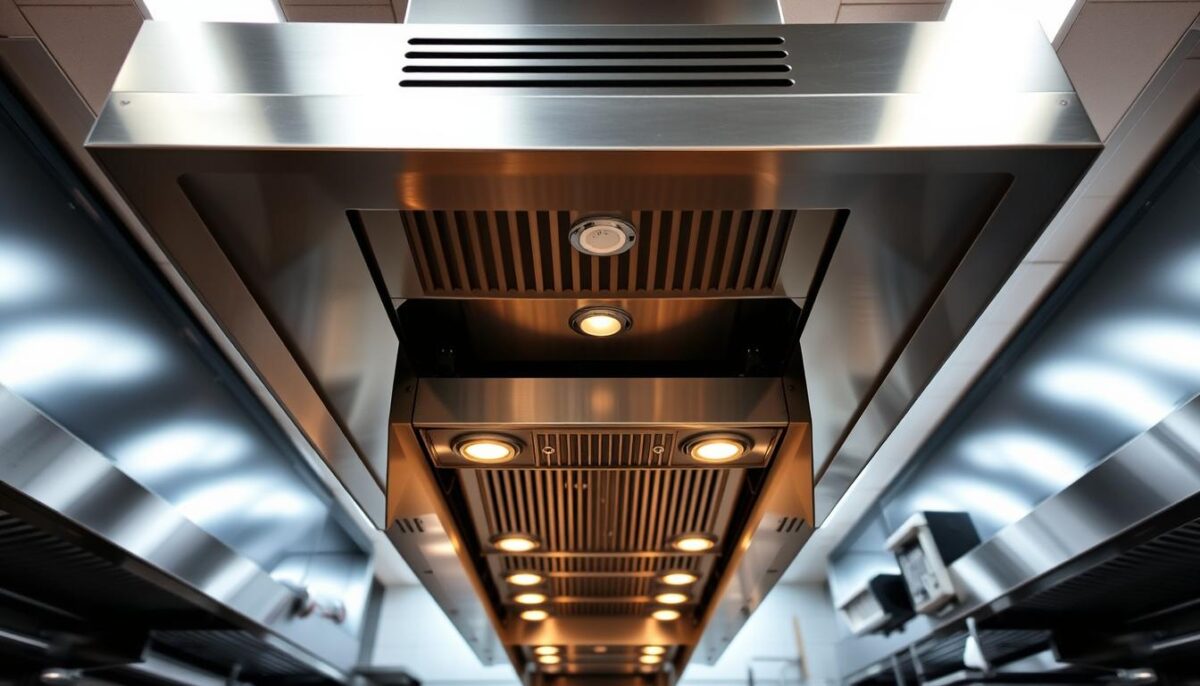
Gas and Electrical Connections
For gas grills, a licensed professional must install the gas line, understanding local codes and safety requirements. Many jurisdictions require specific permits for gas line installation or modification. Electrical connections, on the other hand, must support the appropriate voltage and amperage, often requiring dedicated circuits. Ensuring these connections are done correctly is vital for safety and compliance.
Proper installation of your commercial grill is crucial not just for performance but for safety and regulatory compliance. Ventilation requirements are among the most significant considerations, with commercial hood systems often costing more than the grill itself.
Energy Efficiency and Operating Costs
Understanding the energy efficiency of your commercial grill can significantly impact your bottom line. As a crucial aspect of commercial kitchen operations, optimizing energy efficiency can lead to substantial cost savings.
BTU Ratings Explained
The heating capacity of a commercial grill is determined by its BTU (British Thermal Unit) rating, which signifies the amount of heat it can generate in an hour. A higher BTU measurement generally suggests a more powerful grill capable of reaching higher temperatures to cook food at a quicker pace.
For example, large dining establishments with high demand might require a grill with a high BTU rating, while smaller businesses might be adequately served with a lower BTU grill, consuming less fuel.
| BTU Rating | Typical Use | Energy Consumption |
|---|---|---|
| Low (less than 20,000 BTU) | Small cafes, low-demand kitchens | Low |
| Medium (20,000-50,000 BTU) | Medium-sized restaurants, moderate demand | Moderate |
| High (more than 50,000 BTU) | Large restaurants, high-demand kitchens | High |
Strategies for Reducing Fuel Consumption
To minimize operating costs, consider grills with independent heat zones that allow you to use only the necessary cooking surface, reducing unnecessary fuel consumption. Modern commercial grills often feature improved insulation and heat retention, significantly reducing energy use.
Regular maintenance plays a crucial role in maintaining energy efficiency. Dirty burners and grease buildup can dramatically increase fuel consumption. Additionally, consider the cost differences between gas types in your area, as natural gas is typically less expensive than propane.
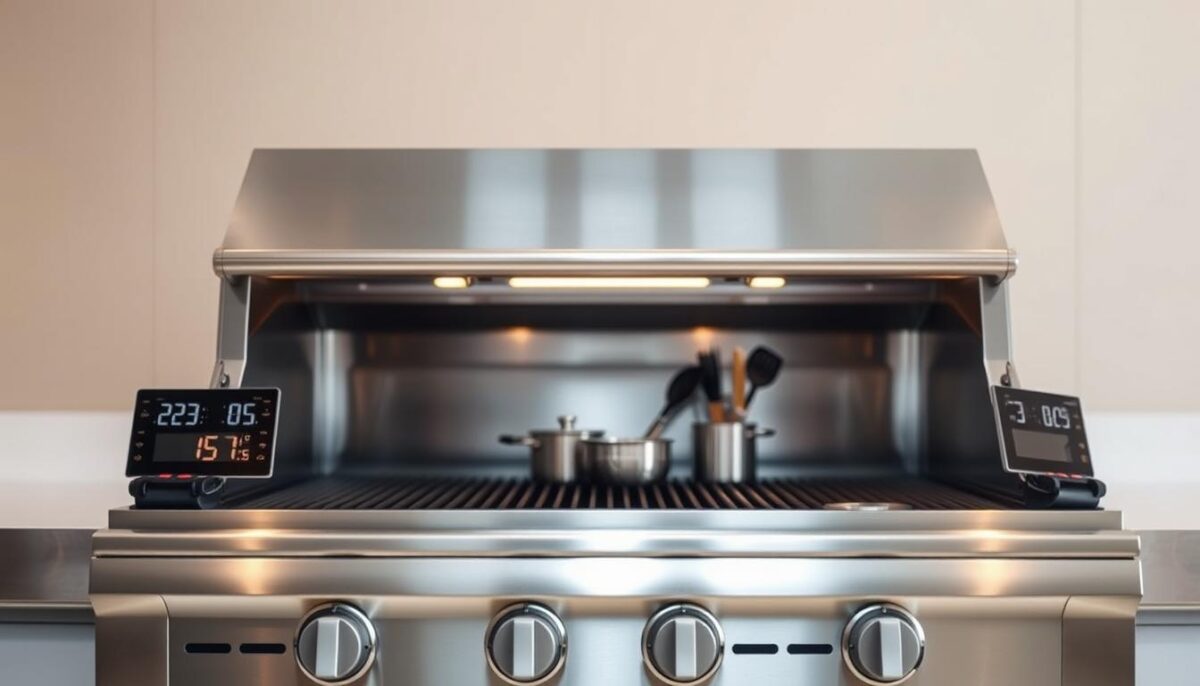
Essential Safety Features for Commercial Grills
In my experience, the most critical aspect of a commercial grill setup is not just about the food it produces, but also about ensuring the safety of everyone involved. To safeguard both the user and consumer, every commercial grill and the kitchen where it is installed should incorporate crucial safety features.
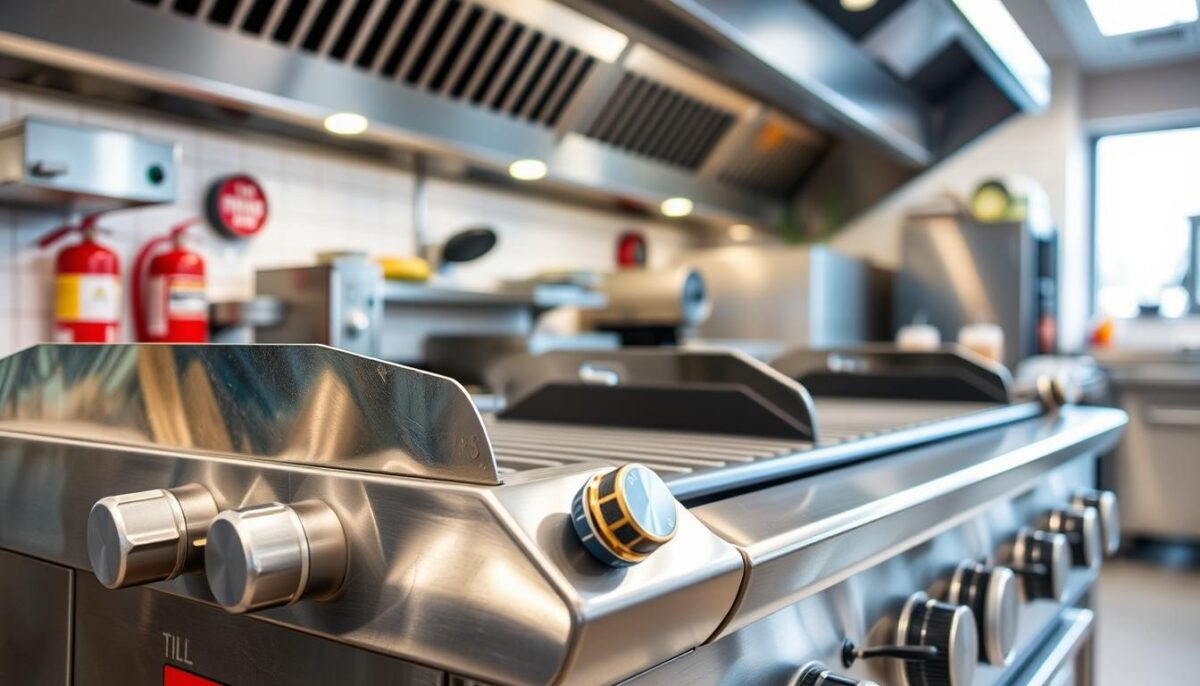
Fire Prevention Systems
Modern commercial grills incorporate sophisticated safety systems that can prevent fires before they start and minimize damage if they do occur. Proper grease management is essential for fire prevention – accumulated grease is the leading cause of grill fires in commercial kitchens. Automatic shut-off valves and fire-suppression systems should be integrated with your grill and hood system for immediate response to detected flames.
Temperature Controls and Automatic Shutoffs
Temperature controls with built-in safeguards prevent dangerous overheating that can damage equipment and create fire hazards. I always emphasize the importance of automatic shut-off systems that can detect gas leaks or overheating and immediately cut power or fuel. Staff training on safety features and emergency procedures is just as important as having the right equipment installed.
Grill Materials and Construction Quality
In the world of commercial grills, the quality of materials and construction can significantly impact the grill’s overall performance. The material used to make the commercial grill helps to determine how durable it’ll be. Some of the strongest, longest-lasting grill materials include stainless steel, cast brass, and cast stainless steel.
Cooking Surface Materials
The cooking surface material is perhaps the most critical component of a commercial grill. Cast iron plates offer good heat retention capacity and are most commonly used, perfect for busy establishments but require regular seasoning. Other options include aluminum plates, which provide rapid heating and are usually more budget-friendly, and ceramic plates, which offer almost instant heating and simple cleaning but are more expensive.
- Cast iron provides excellent heat retention and distribution but requires regular maintenance.
- Stainless steel cooking surfaces offer easier maintenance than cast iron but may not provide the same heat retention properties.
- Chrome-plated surfaces are found on some griddles and offer non-stick properties with easier cleaning.
Body Construction and Durability
The thickness of metal components significantly impacts durability – thicker gauge steel prevents warping and extends the life of your grill. I recommend commercial-grade stainless steel for the exterior and frame construction due to its corrosion resistance and durability in high-heat environments. Welded construction is generally superior to bolted assembly for long-term durability in high-volume operations.
By focusing on quality materials and construction, you can ensure your commercial grill remains a valuable asset for years to come.
Top Commercial Grill Brands
Top commercial grill brands offer a range of models that vary in performance, quality, and price, making it important to choose one that fits your specific needs. With numerous options available, selecting a reputable brand is crucial for ensuring reliability, cooking performance, and service support.
Cooking Performance Group
Cooking Performance Group is a trusted brand known for its performance-driven commercial kitchen products. Their griddles are designed for maximum productivity in compact designs, while their char grills offer quick and consistent heat. I’ve found their griddles particularly impressive for their fast recovery times and consistent heat distribution across the cooking surface.
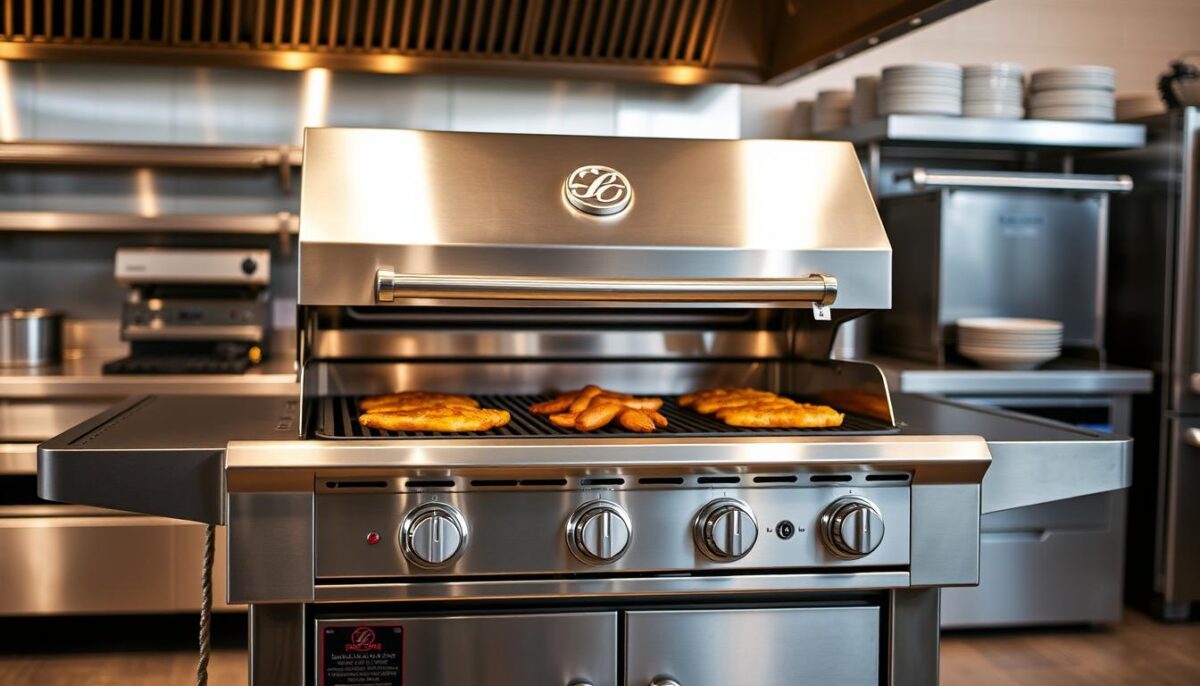
Globe
Globe Food Equipment Co. stands out for its professional-grade cooking equipment, featuring robust construction and energy efficiency. Their panini presses are notable for heavy-duty cast iron plates and durable stainless steel construction, making them highly reliable in high-volume kitchens.
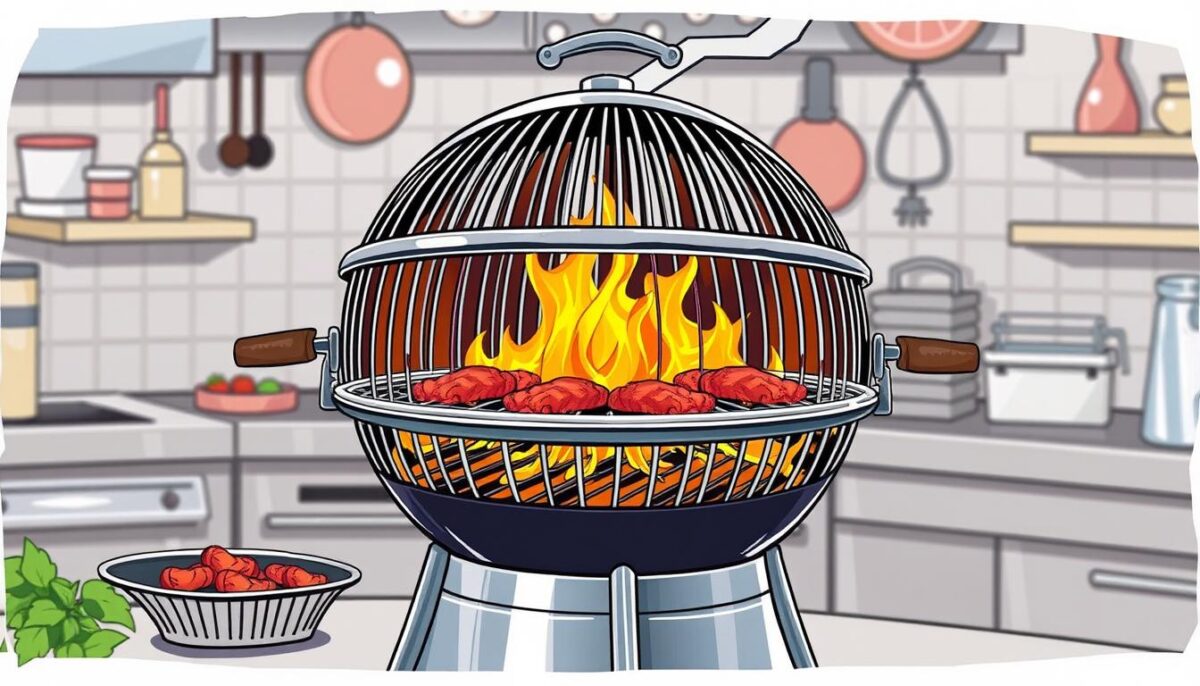
Avantco
Avantco Equipment offers affordable commercial kitchen appliances without compromising on quality. Their electric griddles, such as the P78 grooved commercial panini sandwich grill, are known for rapid heating and sturdy cast iron plates, making them popular among food trucks and cafes.
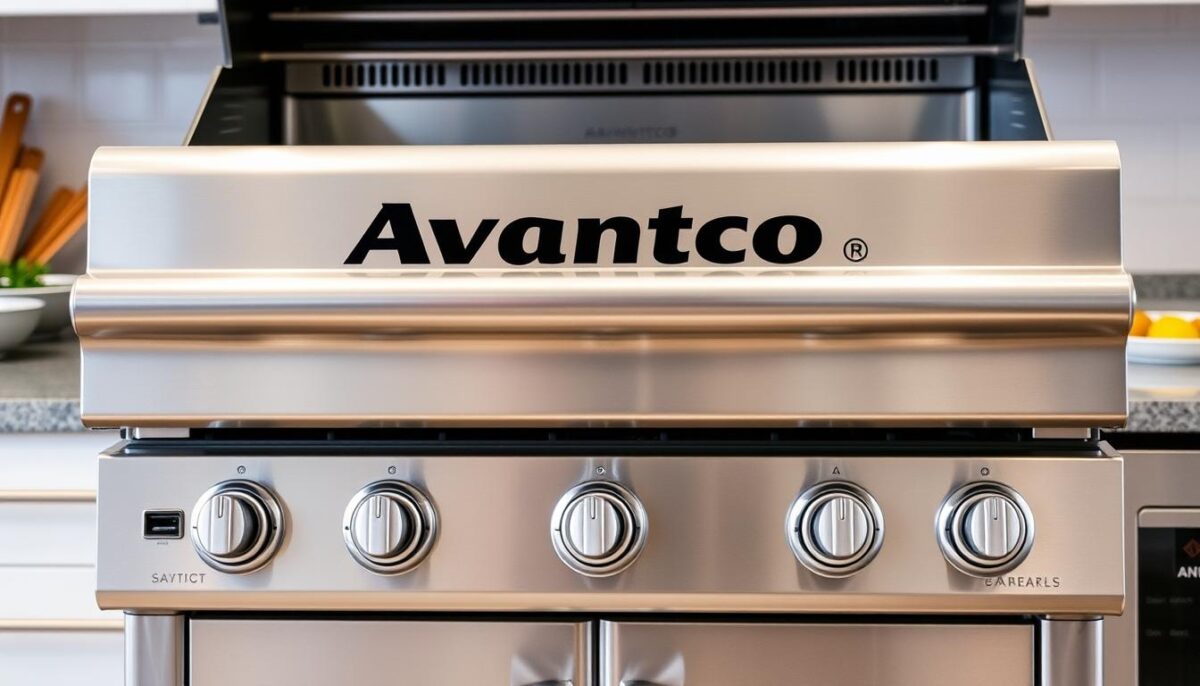
Vulcan
Vulcan, with its long history dating back to 1865, delivers high-quality cooking equipment that combines convenience and efficiency. Their flagship models, like the VCRG-M Series of high-performance manual control gas griddles, are industry standards in steakhouses and high-end restaurants, praised for superior heat control and longevity.
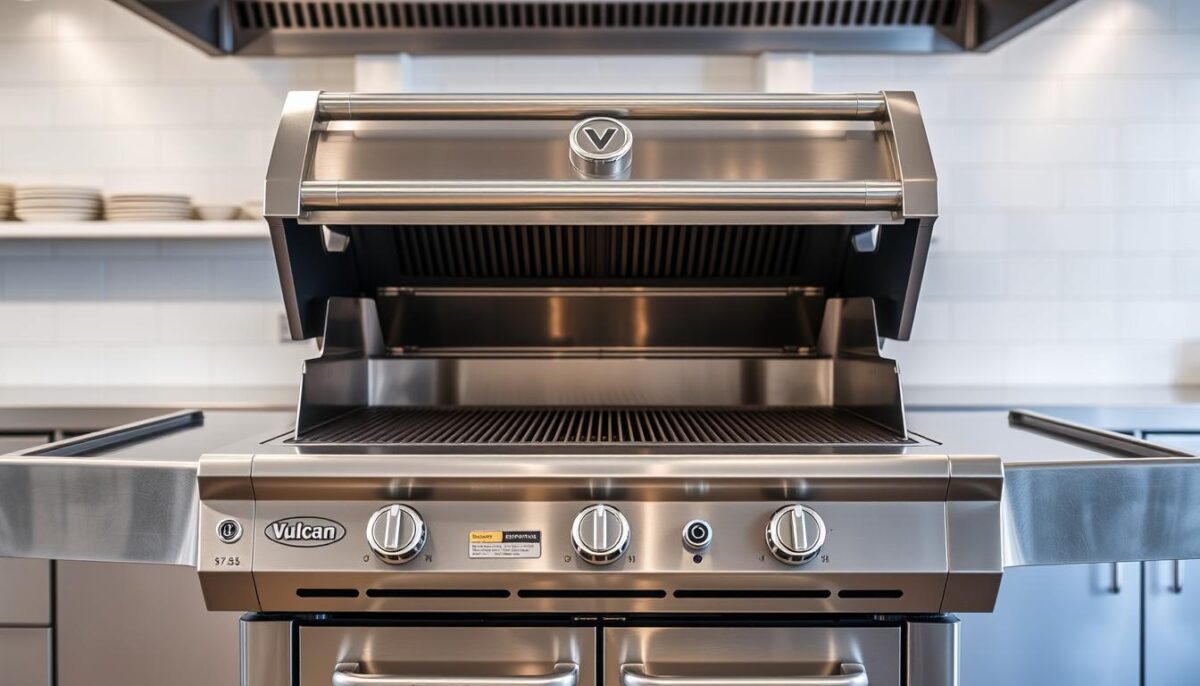
When evaluating these brands, it’s essential to consider not just the equipment quality but also parts availability, service networks, and warranty terms to ensure you’re making a well-informed decision.
Recommended Models for Different Budgets
Commercial grills come in a wide range of prices, making it vital to choose one that aligns with your budget. The key is to balance the initial cost with long-term value and performance needs.
Entry-Level Commercial Grills
For entry-level operations, I recommend models like the Avantco EG24 electric griddle or the Cooking Performance Group CPU-36 charbroiler. These models offer essential features at accessible price points, typically ranging from $500-1,500. They provide good performance for lower-volume operations or supplementary cooking stations.
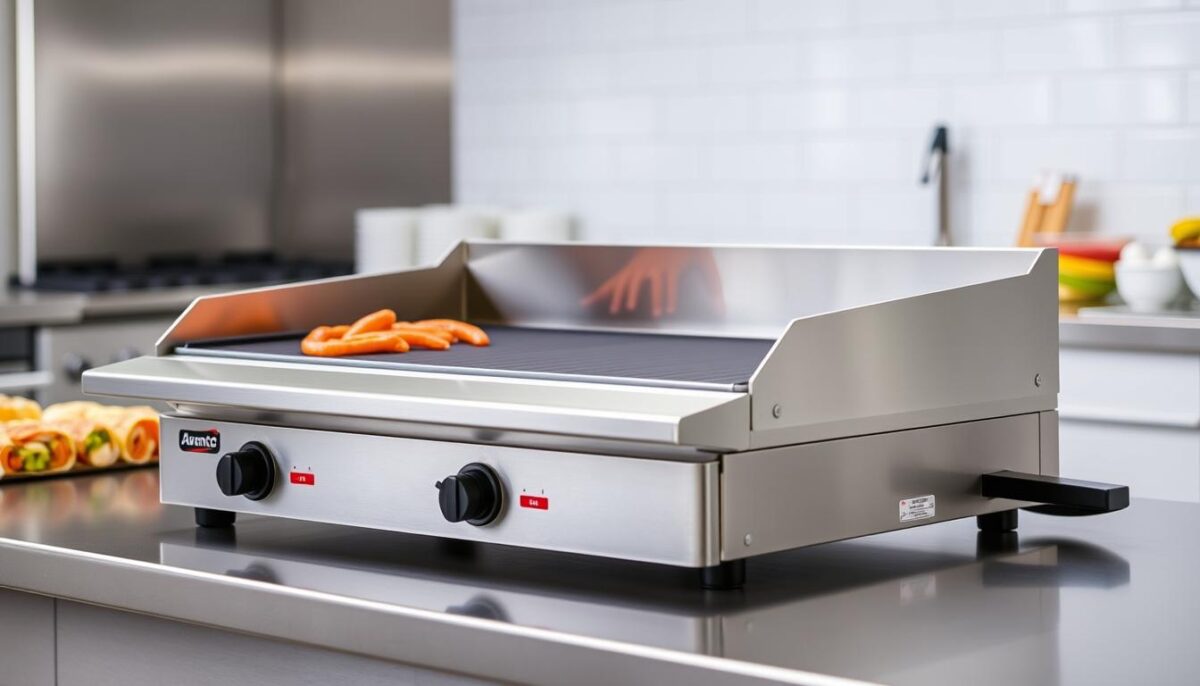
Mid-Range Options
Mid-range commercial grills, priced between $1,500-4,000, offer significant upgrades in durability and performance. Models like the Globe GCD36G gas charbroiler feature thicker cooking surfaces, more precise temperature controls, and better heat distribution for consistent results.
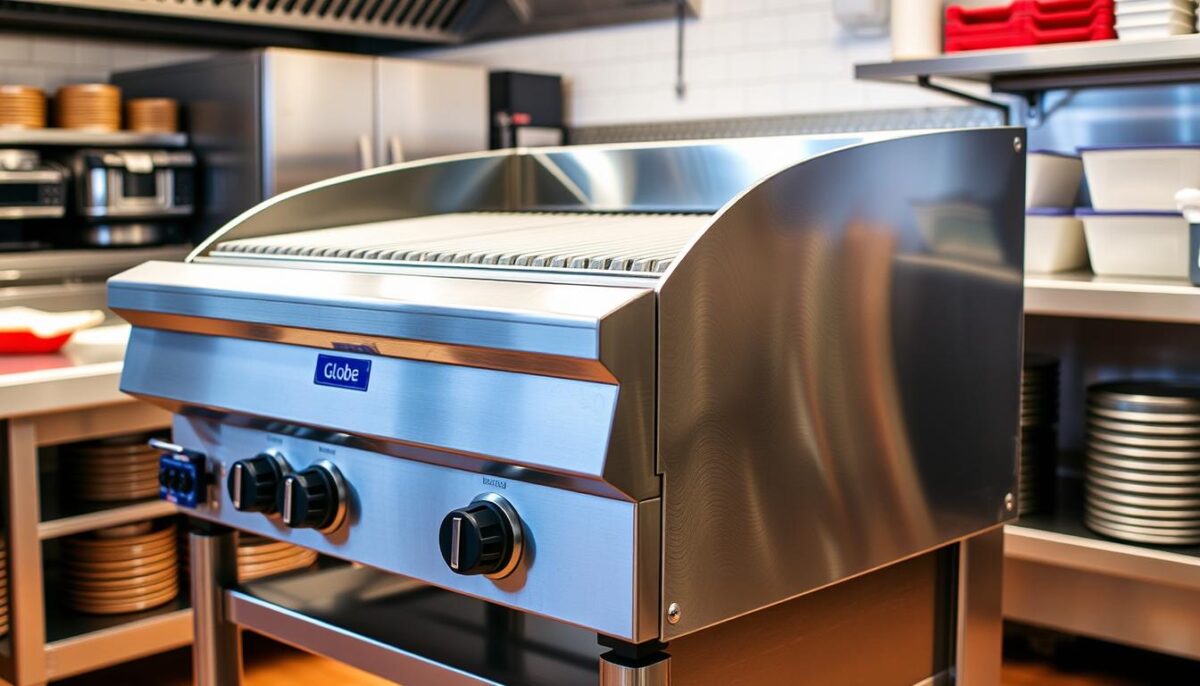
Premium Commercial Grill Setups
Premium commercial grill setups from manufacturers like Vulcan and Garland represent significant investments but deliver exceptional performance and longevity. High-end models often feature innovations like infrared technology, zone-specific temperature controls, and commercial-grade stainless steel construction throughout. When considering premium models, it’s essential to factor in the total cost of ownership, including potential energy savings and extended lifespan.
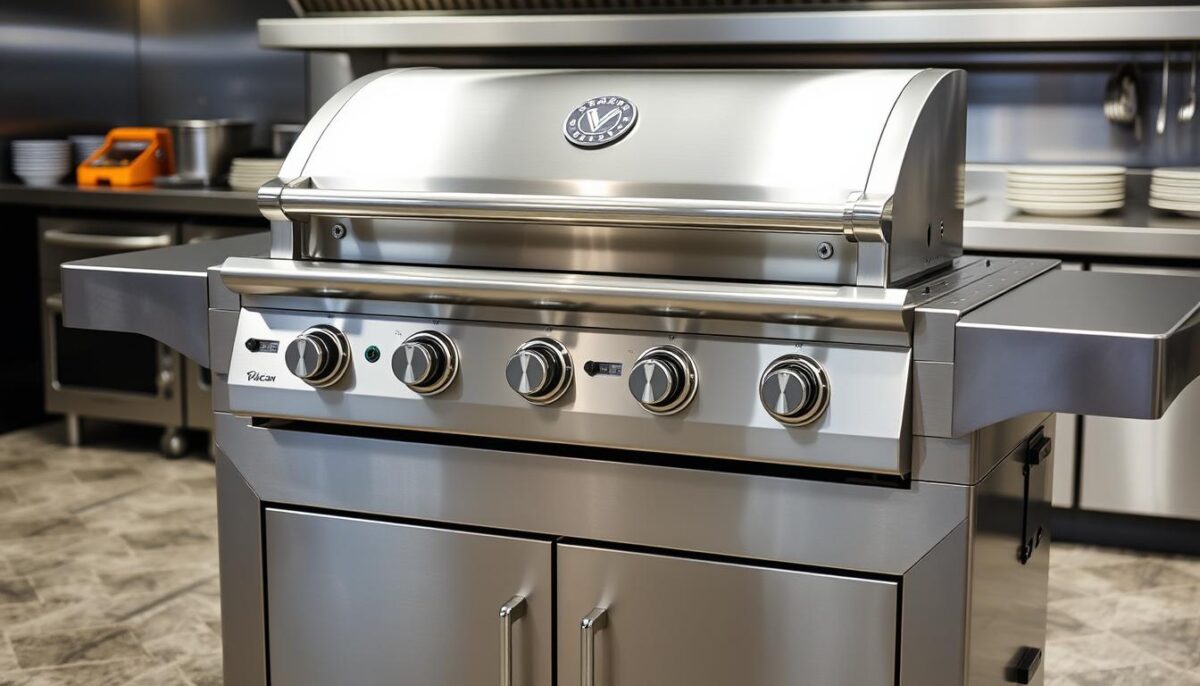
When choosing a commercial grill, it’s crucial to consider not just the purchase price but also the total cost of ownership. Many equipment suppliers offer financing options that can make premium models more accessible. Additionally, installation costs can vary significantly between models, so it’s vital to factor these into your budget calculations.
Maintenance Tips to Extend Your Grill’s Lifespan
Regular maintenance is the key to maximizing the lifespan of your commercial grill. By incorporating simple daily and seasonal tasks into your routine, you can ensure your grill continues to perform optimally and remains a valuable asset to your business.
Daily Cleaning Procedures
Daily cleaning is essential for preventing grease buildup and flavor transfer. I recommend scraping the cooking surface while it’s still warm to remove food particles before they become carbonized. For griddles and flat tops, using a grill brick with oil is effective for cleaning without damaging the surface. Char grills require regular cleaning of grates and burners to prevent flare-ups.
- Scrape cooking surfaces while warm
- Use a grill brick with oil for griddles and flat tops
- Clean grates and burners on char grills regularly
Seasonal Maintenance
Seasonal deep cleaning should focus on components not covered in daily maintenance, such as burner tubes, ignition systems, and grease traps. Calibrating temperature controls quarterly ensures accurate cooking temperatures, crucial for food quality and safety. Professional service visits once or twice a year can identify potential issues before they lead to equipment failure.
- Deep clean burner tubes, ignition systems, and grease traps seasonally
- Calibrate temperature controls at least quarterly
- Schedule professional service visits annually
Accessories That Enhance Your Commercial Grill Setup
Maximizing your grill’s potential requires the right tools and accessories. The right accessories can dramatically improve your grill station’s efficiency and your staff’s ability to produce consistent, high-quality food.
Essential Tools and Utensils
Commercial-grade spatulas, tongs, and scrapers designed specifically for your grill type are essential investments. I recommend stainless steel tools with ergonomic handles for durability and comfort during long service periods. Temperature probes and infrared thermometers allow for precise cooking and food safety verification.
Storage and Organization Solutions
Storage solutions like magnetic tool bars and utensil holders keep essential items within reach while maintaining an organized workspace. Under-grill shelving and nearby refrigerated drawers can dramatically improve workflow. Heat-resistant gloves protect staff from burns while handling hot grates and components.
Specialized accessories like grill presses and bacon weights can improve product consistency and cooking speed. By incorporating these accessories and implementing effective storage and organization systems, you can significantly enhance your commercial grill setup.
Warranty and Service Considerations
As you select a commercial grill, warranty and service considerations should be at the forefront of your decision-making process. A comprehensive warranty can provide peace of mind, while reliable service support ensures that any issues are resolved promptly, minimizing downtime.
Understanding Warranty Coverage
It’s essential to thoroughly read and understand the warranty terms before making a purchase. Pay particular attention to the coverage duration for different components, as many commercial grills offer varying warranty periods for the chassis versus mechanical components like burners and ignition systems.
- Check the length of warranty coverage for different parts.
- Understand what is included and excluded from the warranty.
- Look for extended warranty options for additional protection.
Service Plans and Support
In addition to warranty coverage, the availability of local authorized service technicians is crucial. Even the best warranty can be frustrating if you have to wait days for repairs during busy seasons. Consider service plans that include preventative maintenance visits to help identify potential issues before they cause equipment failure.
| Service Feature | Importance | Benefits |
|---|---|---|
| Local Authorized Technicians | High | Quick response times, minimizing downtime |
| Preventative Maintenance | High | Reduces risk of equipment failure, prolongs lifespan |
| 24/7 Customer Support | Medium | Assistance available at any time |
By carefully evaluating warranty and service options, you can make an informed decision that supports the long-term success of your business. Keep detailed records of all maintenance and service to ensure coverage claims are honored and to help identify recurring issues, ultimately enhancing the overall support you receive from your commercial grill manufacturer.
My Personal Experience: What I’ve Learned from Years in the Business
After years in the commercial kitchen industry, I’ve gained valuable insights into what makes a great grill. Working with dozens of commercial kitchens has taught me that the right grill can be a game-changer for a business.
I’ve observed that the most successful operations prioritize reliability and consistency over flashy features or the lowest initial price point. A quality grill becomes the cornerstone of a kitchen’s operation, while a problematic one can create constant frustration and inconsistent food quality.
- Staff input is crucial during the selection process, as they often have practical insights into what works best.
- Grills with simpler mechanical systems tend to have fewer maintenance issues and longer operational lifespans.
- Restaurants with signature items benefit from specialized grills optimized for those dishes.
Over my years in the business, I’ve seen many operations struggle after choosing grills based primarily on price rather than operational needs and long-term value. My personal preference leans toward heavy-duty gas grills with manual controls for most operations – they offer the best balance of performance, reliability, and repairability.
Maintaining a good relationship with your equipment supplier is also crucial, as they can provide invaluable support. Some successful kitchens I’ve worked with maintain older, well-maintained grills rather than constantly upgrading to newer models.
Conclusion
In conclusion, finding the ideal commercial grill setup requires careful consideration of several factors, including your menu, volume, space constraints, and budget.
Throughout this guide, we’ve explored the various types of commercial grills and power sources available, helping you make an informed decision that will impact your operations, food quality, and bottom line for years to come.
Remember, investing in quality grill equipment from reputable manufacturers typically pays dividends through improved reliability, consistency, and longevity. Proper installation, regular maintenance, and staff training are also crucial in maximizing your grill’s performance and lifespan.
With the right commercial grill tailored to your specific needs, you’ll be well-positioned to maximize efficiency, food quality, and ultimately, your sales. I encourage you to take your time with this decision and wish you the best of success in your culinary ventures.
FAQ
What type of gas is recommended for my commercial grill?
I recommend using natural gas or propane for your commercial grill, as they provide a consistent and reliable heat source. When choosing between the two, consider the availability and cost of each in your area.
How often should I clean my commercial grill?
To maintain your grill’s performance and extend its lifespan, I suggest cleaning it daily after use. This includes scraping the cooking surface and wiping down the exterior with a mild detergent.
What is the ideal BTU rating for a commercial grill?
The ideal BTU (British Thermal Unit) rating depends on the size of your grill and your cooking needs. A higher BTU rating generally means faster heat recovery, but it also increases fuel consumption. I recommend consulting the manufacturer’s guidelines to determine the optimal BTU rating for your specific grill model.
Can I use my commercial grill for cooking a variety of menu items?
Yes, many commercial grills are versatile and can be used for cooking a range of menu items, from burgers and sandwiches to steaks and premium meats. When selecting a grill, consider the types of food you plan to cook and choose a model that suits your needs.
How do I ensure proper ventilation for my commercial grill?
Proper ventilation is crucial for removing grease, smoke, and heat from your kitchen. I recommend installing a hood system above your grill and ensuring that it is properly maintained and cleaned regularly.
What are the benefits of using a stainless steel commercial grill?
Stainless steel grills are durable, resistant to corrosion, and easy to clean. They also provide a non-reactive cooking surface, which helps preserve the flavor and quality of your food.
How can I reduce my commercial grill’s energy consumption?
To reduce energy consumption, I suggest optimizing your grill’s temperature controls, using a timer, and ensuring that your grill is properly maintained. Additionally, consider upgrading to a more energy-efficient model or using infrared grills, which can be more fuel-efficient.
